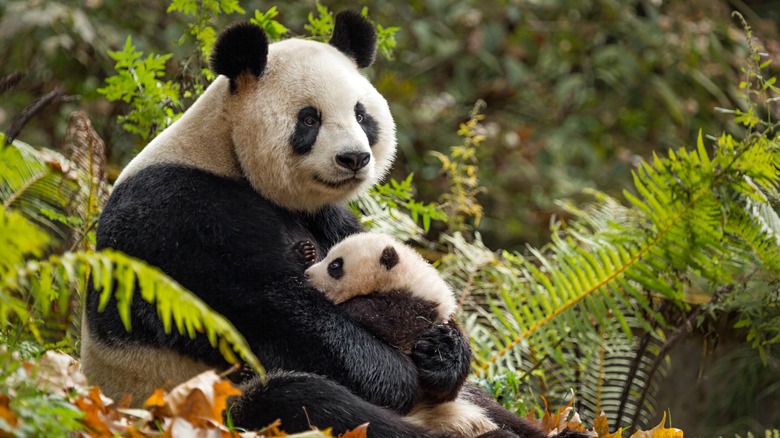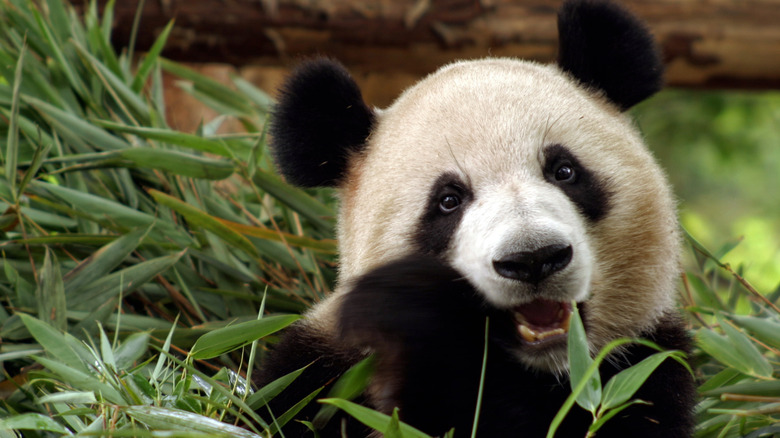The Real Reason China Once Gifted Giant Pandas To Other Countries
In the wild, the giant panda lives in temperate forests in southwest China (via the World Wildlife Fund). According to the Los Angeles Times, China is the only country that these pandas are native to, so all pandas found in zoos outside that country are on loan or were a gift decades ago from the Chinese government. The world's oldest male giant panda in captivity, 35-year-old An An, was euthanized in July in Hong Kong, where it had lived since 1999, as the Associated Press reports (via USA Today).
There are multiple reasons behind why China gives out giant pandas to other countries, but it is mostly diplomatic. China uses these pandas as a form of negotiation with the countries to which the bears are given.
According to History, the act of "panda diplomacy" may have started as early as the seventh century Tang Dynasty, when China's Empress Wu Zeitan sent two bears to Japan. History reports that since a change in policy in 1984, China has stopped giving away the pandas outright. Instead, since 1991, China has offered pandas to other countries on a 10-year lease, which costs the country receiving the panda up to $1 million per year. Any cubs born of these leased pandas are also the property of China, per the lease agreement. According to political scientist Joseph S. Nye, Jr. in his 2004 book "Soft Power: The Means to Success in World Politics," the leasing of giant pandas to other countries can be seen as a way for China to increase its cultural appeal across the world (via Harvard Law School).
The giant panda is a Chinese national treasure
It's generally believed that the reason China uses panda diplomacy to negotiate with other countries is largely due to the appeal of these cuddly creatures. According to Harvard Law School, "China uses perhaps its most prominent national symbol, the panda bear, to build bridges with key partners and enhance its prestige worldwide." These adorable pandas work to spread positive messages about Chinese culture, politics, and policies just with their existence in other countries around the world. The pandas also soften China's image internationally.
Another reason China has chosen to lease the giant panda is as a sign of respect or friendship toward other nations. According to China Today, the panda is China's national treasure and is one of the most widely loved animals worldwide. By sharing the giant panda with other countries, China is allowing the rest of the world to have an experience of this unique aspect of its culture. The tactic is wildly successful; the Los Angeles Times reported that a pair of pandas that spent 200 days in the San Diego Zoo in 1987 drew an estimated 2 million visitors.
Pandas in United States zoos are an important part of conservation efforts
Not only are pandas used by China to gain favor with other countries, these pandas play a special role in conservation efforts for the species and other endangered animals. In 2016, the giant panda was officially moved from the endangered species list, reclassified to "vulnerable" status on the IUCN Red List. Because conservation efforts allowed the giant panda population to increase, the World Wildlife Fund has made the species a part of its logo.
The United States only allows leased pandas to live in the U.S. if China proves that more than half of the annual lease fee is used for conservation efforts to save the habitats of wild pandas (via History). This policy has ensured that panda habitats in China are protected, allowing the species to increase its population numbers in the wild. Pandas in captivity have also helped to raise awareness of this vulnerable species, as well as increase populations through breeding programs to prevent the giant panda's extinction.


